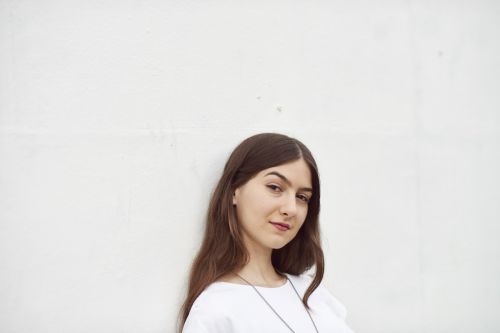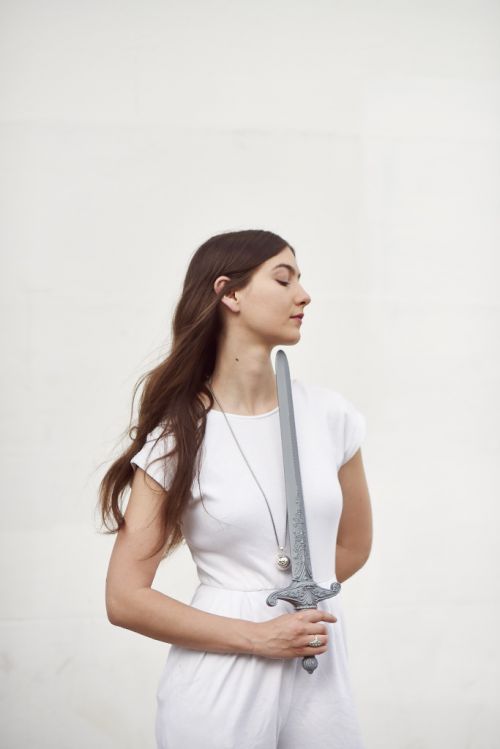As a child, Natalie Mering filled her guitar with pencils in a frustrated attempt to try to change her instrument and progress beyond her two-chord repertoire. It hardly comes as a surprise, then, that the first songs she ever played were of her own making.
As Weyes Blood, the American indie musician builds a foggy psych-folk dream that contemplates the experimental elements of those days. Her previous album The Innocents, released in 2014, was based on her deep brooding voice and traditional instruments set against electronics, tape effects and melodic delays culminating in a modern yet timeless piece of work. Her new artistic endeavour, a dreamy four-song EP coming out in October, reflects Natalie’s desire to evolve as a musician, taking a step-forward into self-production while keeping Weyes Blood’s signature ethereal quality.
Natalie took the time to speak to me on a sunny Monday morning in Rockaway Beach before her daily ocean dip. Here, she talks transcendence, mermaids and letting go of expectations.

What are your plans for the day?
I’m going to the bank – it should be fun! And then I’m going to the beach. I’ll take a dip into the ocean. I do that every day, which is very nice.
I’ve seen quite a few pictures of you looking like a mermaid, sitting on a rock by the ocean or just floating. Are mermaids particularly representative to you?
Yes! Swimming is one of my favourite things in the whole world. I always live somewhere near water, which is why I just had a lot more opportunities to take pictures around water. It’s like a purifier. There’s a spiritual cooling that happens when you jump into water; your body relaxes immediately and blood pumps in all areas it wasn’t in before. But mystically, yeah, I’d like to be a mermaid. I like the concept of mermaids as singing sirens leading people to the rocks.
I feel nature plays a big part in your music – especially on your album The Innocents. Do you agree?
Definitely. The biosphere, the whole planet, the organisms, the seasons... Winters are insane. They’re like the darkest period of time. I grew up in Southern California so all the East Coast winters that I had have been tremendously hard for me to cope with. It’s the most desolate feeling in the world.
What feeling do you get out of making music?
Every feeling you can possibly imagine. I try to focus on timeless feelings or feelings that kind of give you a sense of transcending time or being unlocked from the materialisms of the world, not being trapped inside your body. The concept of transcendence is important to me.

How did you get into making music?
I started making music as a little kid. My father was a musician and we had guitars around the house. I started taking piano lessons when I was six years old and then playing guitar and immediately writing songs. I was really into Nirvana and the grunge movement of the 90s. I had a little tape recorder, a tape deck, and I would record little novelty radio programs, like a talk show radio, and I’d play a song on the guitar. Right from the beginning there was kind of that pushing forward element and I was just like: “I’m going to learn new songs”. I would start by writing my own song and it wasn’t until later that I learned other people’s songs to get a wider palette musically.
When you think of how you started making music at such a young age, how does it feel to be a professional musician now, as an adult?
It’s about trying to balance two worlds. The goal is finding the way to be yourself and not who you thought you would be. I have a desire to make music and I hear it in my mind and I have to learn how to technically execute that on stage and on record, and also be free from expectations. I have friends in music that don’t have a label that supports them or make a lot of money - they’re doing it as a sacrifice out of their own heart and that’s a good place to be coming from. The music industry is not what you heard of as a kid with your CDs, jamming and dancing around your room – that kind of magic is untouchable. So when you’re deep into music industry stuff and want to be able to tour and survive from it as an adult, it’s really important to keep those worlds separate.
How do you do that?
By making music that people might never hear, just for yourself. Or by taking yourself less seriously for a second and trying to let go of any kind of expectation you might have had.
Your music project doesn’t go by your real name – it was named after Flannery O’Connor’s novel Wise Blood. Do you ever catch yourself thinking about the dissonance between yourself as an artist and as a person?
It’s something that occurs to everybody: the person and the artist can be a little different. I’m very silly and I like to make jokes, whereas my music is kind of serious. Part of the evolution of making music is trying to put yourself out there in the most honest, unadulterated way, so I’m trying not to have that kind of dissonance where “this is my music personality” and “this is my real personality”. It’s all supposed to be the same.

